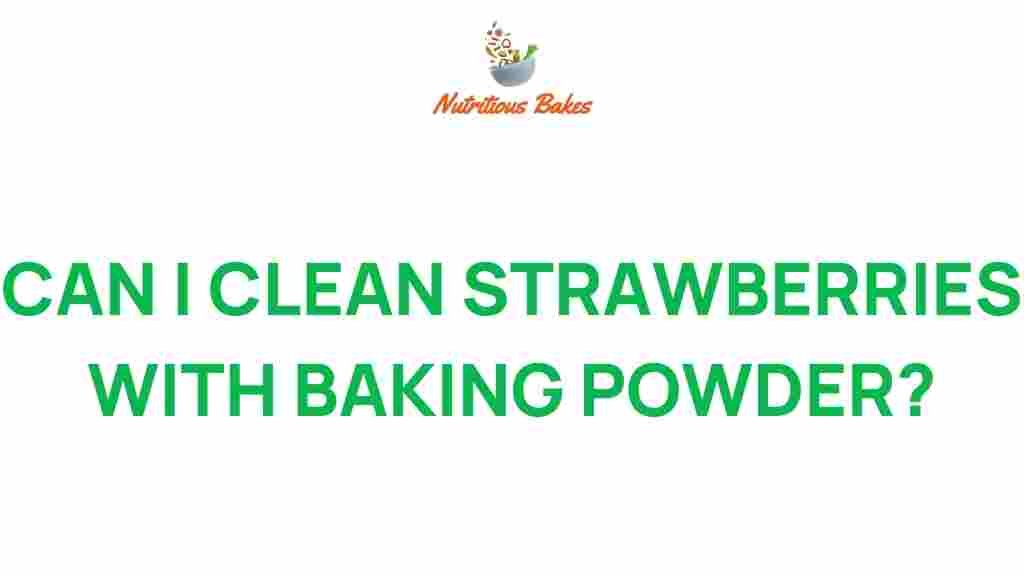The Surprising Truth: Can Baking Powder Clean Strawberries?
When it comes to cleaning produce, especially fruits like strawberries, many people are on the lookout for effective and safe methods. With growing concerns about pesticide residues and food safety, the question arises: can baking powder effectively clean strawberries? In this article, we will explore the surprising truth about baking powder, how to use it for cleaning strawberries, and other kitchen tips for safe food preparation.
Understanding Baking Powder
Baking powder is a common ingredient found in most kitchens, primarily used as a leavening agent in baking. It consists of a mixture of baking soda, acid, and a moisture-absorbing agent. While its main purpose is to help baked goods rise, it has also gained attention as a potential natural cleaner.
Why Clean Strawberries?
Strawberries are one of the most popular fruits consumed worldwide, but they can also harbor dirt, bacteria, and pesticide residues. Here are a few reasons why cleaning strawberries is essential:
- Food Safety: Cleaning produce helps reduce the risk of foodborne illnesses.
- Pesticide Residues: Many strawberries are treated with pesticides that can be harmful if ingested.
- Better Taste: Cleaning strawberries improves their taste and texture by removing contaminants.
How to Clean Strawberries with Baking Powder
Now that we understand the importance of cleaning strawberries, let’s dive into the method of using baking powder for this task. Below is a step-by-step guide to effectively clean strawberries using baking powder.
What You Will Need
- 1 cup of fresh strawberries
- 1 tablespoon of baking powder
- A bowl or basin
- Water
- A colander or strainer
Step-by-Step Process
Follow these simple steps to clean your strawberries using baking powder:
- Prepare the Solution: In a bowl or basin, combine 1 tablespoon of baking powder with 2 cups of water. Stir well until the baking powder is fully dissolved.
- Soak the Strawberries: Place the strawberries in the baking powder solution. Allow them to soak for about 5-10 minutes. This soaking time helps loosen dirt and residues.
- Gently Agitate: While the strawberries are soaking, gently agitate the water with your hands. This action helps dislodge any dirt or contaminants from the surface of the strawberries.
- Rinse Thoroughly: After soaking, remove the strawberries from the solution and place them in a colander. Rinse them thoroughly under running water to remove any remaining baking powder and contaminants.
- Dry the Strawberries: Pat the strawberries dry with a clean paper towel or a clean kitchen cloth. This step is essential to remove excess moisture before storage.
Additional Kitchen Tips for Cleaning Produce
Using baking powder is just one method for cleaning strawberries. Here are some additional kitchen tips for cleaning produce effectively:
- Use Vinegar: A mixture of vinegar and water (1 part vinegar to 3 parts water) can also be effective in removing residues.
- Brush Firm Fruits: For firmer fruits like apples or potatoes, use a soft brush to scrub the surface while rinsing under water.
- Peel When Necessary: For certain fruits and vegetables, peeling may be the best option to remove contaminants.
Common Troubleshooting Tips
While cleaning strawberries with baking powder is generally effective, you might encounter some issues. Here are troubleshooting tips for common problems:
- Stubborn Dirt: If dirt remains after soaking, repeat the soaking process for another 5 minutes.
- Flavor Alteration: If you notice a slight taste alteration from the baking powder, ensure you rinse the strawberries thoroughly and dry them properly.
- Soft Strawberries: If your strawberries are overly ripe, handle them gently to avoid bruising.
Alternative Natural Cleaners
Aside from baking powder, there are other natural cleaners you can use to clean your strawberries and other produce:
- Baking Soda: Similar to baking powder, baking soda can be used to clean fruits and vegetables. Use the same soaking method as described above.
- Salt Water: A solution of salt and water can help kill bacteria. Mix 1 tablespoon of salt in 1 cup of water and soak your strawberries for a few minutes.
- Commercial Produce Wash: There are also commercial produce washes available that are specifically designed for cleaning fruits and vegetables.
Storage Tips for Cleaned Strawberries
Once your strawberries are clean, it’s essential to store them properly to maintain freshness:
- Keep Them Dry: Excess moisture can lead to mold. Ensure the strawberries are dry before storing them.
- Refrigerate: Store cleaned strawberries in the refrigerator in a breathable container to prolong freshness.
- Avoid Washing Until Ready to Eat: It’s best to wash strawberries just before consuming to maintain their texture and shelf life.
Conclusion
In conclusion, baking powder can indeed be an effective way to clean strawberries, providing a safe method to reduce contaminants and improve food safety. By following the steps outlined in this article, you can ensure that your strawberries are clean and ready for consumption. Don’t forget to implement other kitchen tips and natural cleaners in your culinary practices to enhance your food preparation experience.
For more information on food safety and cleaning produce, check out this comprehensive guide on best practices. Remember, keeping your kitchen and produce clean is essential for maintaining a healthy lifestyle!
Explore more culinary hacks and tips to elevate your cooking skills and ensure food safety in your kitchen. Happy cooking!
This article is in the category Tips and created by NutritiousBakes Team

1 thought on “The Surprising Truth: Can Baking Powder Clean Strawberries?”